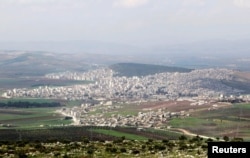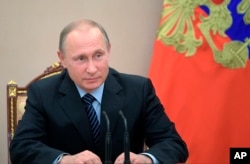Brett McGurk, the U.S. envoy to the coalition fighting Islamic State, flew into Ankara Friday in the latest efforts by Washington to calm mounting tensions involving key allies in the war against IS.
Those tensions threaten to derail efforts to capture the Syrian town of Raqqa, the militants' self-declared capital.
McGurk's visit comes the same day that President Donald Trump spoke by telephone with Turkish President Recep Tayyip Erdogan.
An indication of the difficulty of McGurk's task on this visit: he only met with senior Turkish officials. On previous visits, he met with government ministers and Erdogan himself; but, Erdogan has called for McGurk's removal and accuses him of being too close to the YPG Kurdish militia.
After his meetings Friday, McGurk only said the discussions were about joint efforts to destroy Islamic State. Earlier in the week, McGurk had made clear the U.S. is concerned by Turkish activity in Syria, saying, “It is certain that we wouldn't anything to disrupt the Raqqa campaign.”
Ankara threatens to attack the Syrian enclave of Afrin, which the YPG holds. Turkey's government accuses the YPG of being linked to the PKK, a Kurdish group waging an insurgency in Turkey.
Buildup near Afrin
Turkish forces continue to build up around Afrin both in Syria and Turkey; but, YPG forces make up a large component of the Syrian Democratic Force. U.S. forces are backing the SDF in the fight to capture Raqqa.
YPG commanders have warned an attack by Turkey could push them to redirect their forces away from Raqqa. Despite that warning, Turkish ministers this week stepped up the tough talk. “The Afrin region needs to be cleared of terror elements and terrorists,” Deputy Prime Minister Veysi Kaynak said this week.
Ankara accuses the YPG of launching military operations in Turkey. Turkish security forces Friday said eight Kurdish militants captured in the city of Gaziantep included YPG members, and they were planning to carry out a major attack. The YPG denied allegations it is targeting Turkey.
Until now, Ankara's ability to hit the YPG has been restricted, because both Moscow and Washington support the group.
“Turkey is squeezed between Russia and the U.S. in Syria and its options are limited as it tries to demonize and criminalize the YPG,” said Semih Idiz, a columnist with Al Monitor website.
Ankara, however, senses an opening with Moscow's fury after the U.S. downed a Syrian government jet in mid-May.
“Obviously there is increasing tension in Afrin and that is probably due to changing balance between Russia and U.S. in Syria,” said Aydin Selcen, a former senior Turkish diplomat, who is an expert on Kurdish affairs.
“Turkey sees a window of opportunity. If Turkey can make a deal with Damascus and Moscow like it did with the Al Bab operations, at least it can push back YPG elements. Moscow is trying to pull the YPG back toward Damascus and also to peel away Turkey away from its main ally the U.S.”
Stressing Russian role
Last year Turkish troops backed Syrian opposition forces in ousting IS from the Syrian town of Al Bab.
Ankara appears keen to stress the importance of Moscow in the current tensions. Shortly after Erdogan's phone call with Trump Friday, he spoke with Russian President Vladimir Putin.
Any Turkish operation against Afrin, however, carries risks. “It would pit Turkey against American-supported forces that are fighting with America against IS, and IS is a major target for America, and so this will be a disaster as far as Turkish-American relations are concerned,” Idiz said.
Washington is eager to avoid that, so is expected to intensify its diplomatic efforts.
Even if Turkey moved toward Afrin, it's not clear its forces could capture the whole enclave.
“Afrin is difficult, if not impossible, because of the demographic structure being overwhelmingly Kurdish, as well as it being mountainous,” points out Selcen, the former diplomat. “But they [Turkish forces] can push to control some strategically important towns ... there could be a push by Turkey to fully isolate Afrin.”
Selcen suggests the latest tension over Afrin is part of the jockeying for position for the end of the fighting.
“There will be a final push for control for these spheres of influence in Syria,and then hopefully there will be a table for all sides to sit around in which they exchange something against something else. For example, a political agreement in exchange for territory. That's why all sides are trying to control as much terrain,” he said.






